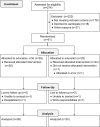Impact of Adding a Decision Aid to Patient Education in Adults with Asthma: A Randomized Clinical Trial
- PMID: 28107540
- PMCID: PMC5249233
- DOI: 10.1371/journal.pone.0170055
Impact of Adding a Decision Aid to Patient Education in Adults with Asthma: A Randomized Clinical Trial
Abstract
Background: Not providing adequate patient education interventions to asthma patients remains a major care gap. To help asthma patients and caregivers discuss inhaled controller medication use, our team has previously developed a decision aid (DA). We sought to assess whether adding this DA to education interventions improved knowledge, decisional conflict, and asthma control among adults with asthma.
Methods: A parallel clinical trial (NCT02516449). We recruited adults with asthma, aged 18 to 65 years, prescribed inhaled controller medication to optimize asthma control. Educators randomly allocated participants either to the education + DA or to the education group. At baseline and two-month follow-up, we measured asthma knowledge (primary outcome) with a validated self-administered questionnaire (score -37 to +37). Secondary outcomes included decisional conflict and asthma control. Blinded assessors collected data. Between the two time points, the within- and between-group changes were estimated by generalized linear mixed models.
Results: Fifty-one participants (response rate: 53%; age: 44 ± 13 years; women: n = 32) were randomized either to the education + DA group (n = 26) or to the education group (n = 25), and included in statistical analyses. Between baseline and follow-up, mean [95% CI] knowledge scores increased from 21.5 [19.9-23.2] to 25.1 [23.1-27.0] in the education + DA group (P = 0.0002) and from 24.0 [22.3-25.7] to 26.0 [24.0-28.0] in the education group (P = 0.0298). In both of the groups, decisional conflict and asthma control improved. There were no differences between groups.
Conclusions: Education improved knowledge, decisional conflict, and asthma control whether the DA was added or not.
Conflict of interest statement
Potential conflicts of interest to disclose are: 1) the Knowledge Translation, Education and Prevention Chair in Respiratory and Cardiovascular Health is supported by unrestricted grants from AstraZeneca, and 2) the Chair on Adherence to Treatments was supported by unrestricted grants from AstraZeneca, Merck Canada, Sanofi Canada, Pfizer Canada and the Prends soin de toi program. M.G., F.L., and J.M. have no conflict of interest to declare. L.P.B. considers having no conflict of interest but wishes to declare what can be perceived as potential conflicts of interest. Advisory Boards: GlaxoSmithKline, Novartis. Conferences (honoraria): AstraZeneca, GlaxoSmithKline, Merck, Novartis. Sponsorship for investigator-generated research: AstraZeneca, GlaxoSmithKline, Merck Frosst, Schering. Sponsorship for research funding for participating in multicenter studies: AllerGen, Altair, Amgen, Asmacure, AstraZeneca, Boehringer-Ingelheim, Genentech, GlaxoSmithKline, Novartis, Ono Pharma, Pharmaxis, Schering, Wyeth. Support for the production of educational materials: AstraZeneca, GlaxoSmithKline, Merck Frosst, Boehringer-Ingelheim, Novartis. Organizational: Chair of the Global Initiative for Asthma (GINA) Guidelines Dissemination and Implementation Committee, Knowledge Translation, Education and Prevention Chair in Respiratory and Cardiovascular Health, Member of the Executive Committee of Interasma (Global Asthma Organization). This does not alter our adherence to all PLOS ONE policies on sharing data and materials. The authors alone are responsible for the content and writing of this paper.
Figures
References
-
- GINA. Global Strategy for Asthma Management and Prevention. Available from: http://www.ginasthma.org/.
Publication types
MeSH terms
Substances
LinkOut - more resources
Full Text Sources
Other Literature Sources
Medical
Miscellaneous


